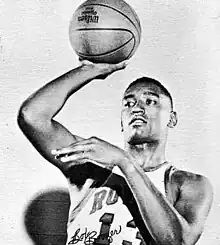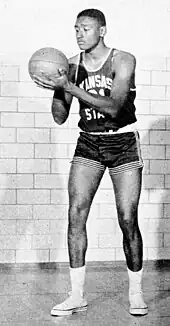Bob Boozer
Robert Louis Boozer (April 26, 1937 – May 19, 2012) was an American professional basketball player in the National Basketball Association (NBA). Boozer won a gold medal in the 1960 Summer Olympics and won an NBA Championship as a member of the Milwaukee Bucks in 1971. Boozer was a member of the 1960 U.S. Olympic team, which was inducted into the Naismith Basketball Hall of Fame as a unit in 2010.
 | |||||||||||||||||||||
| Personal information | |||||||||||||||||||||
|---|---|---|---|---|---|---|---|---|---|---|---|---|---|---|---|---|---|---|---|---|---|
| Born | April 26, 1937 Omaha, Nebraska, U.S. | ||||||||||||||||||||
| Died | May 19, 2012 (aged 75) Omaha, Nebraska, U.S. | ||||||||||||||||||||
| Listed height | 6 ft 8 in (2.03 m) | ||||||||||||||||||||
| Listed weight | 215 lb (98 kg) | ||||||||||||||||||||
| Career information | |||||||||||||||||||||
| High school | Omaha Technical (Omaha, Nebraska) | ||||||||||||||||||||
| College | Kansas State (1956–1959) | ||||||||||||||||||||
| NBA draft | 1959: 1st round, 1st overall pick | ||||||||||||||||||||
| Selected by the Cincinnati Royals | |||||||||||||||||||||
| Playing career | 1959–1971 | ||||||||||||||||||||
| Position | Power forward | ||||||||||||||||||||
| Number | 13, 14, 15, 19, 20 | ||||||||||||||||||||
| Career history | |||||||||||||||||||||
| 1959–1960 | Peoria Caterpillars | ||||||||||||||||||||
| 1960–1963 | Cincinnati Royals | ||||||||||||||||||||
| 1963–1965 | New York Knicks | ||||||||||||||||||||
| 1965–1966 | Los Angeles Lakers | ||||||||||||||||||||
| 1966–1969 | Chicago Bulls | ||||||||||||||||||||
| 1969–1970 | Seattle SuperSonics | ||||||||||||||||||||
| 1970–1971 | Milwaukee Bucks | ||||||||||||||||||||
| Career highlights and awards | |||||||||||||||||||||
| |||||||||||||||||||||
| Career NBA statistics | |||||||||||||||||||||
| Points | 12,964 (14.8 ppg) | ||||||||||||||||||||
| Rebounds | 7,119 (8.1 rpg) | ||||||||||||||||||||
| Assists | 1,237 (1.4 apg) | ||||||||||||||||||||
| Stats at NBA.com | |||||||||||||||||||||
| Stats at Basketball-Reference.com | |||||||||||||||||||||
| College Basketball Hall of Fame Inducted in 2016 | |||||||||||||||||||||
Medals
| |||||||||||||||||||||
Early years

Boozer was born and raised in North Omaha, Nebraska, and graduated from Tech High in Omaha. One of his teammates was future Baseball Hall-of-Famer Bob Gibson.[1] He attended Kansas State University, where he helped lead the Wildcats to the 1958 Final Four[2] and where he received All-America honors in 1958 and 1959. A versatile 6’ 8" forward, he was selected by the Cincinnati Royals with the first non-territorial pick of the 1959 NBA draft, but he postponed his NBA career for one year so that he could remain eligible to play in the 1960 Summer Olympics.[3] During that year he played with the Peoria Caterpillars, where he won the National AAU Tournament title and earned MVP honors for the tournament.[4]
He won a gold medal with the Olympic team after they won eight games by an average of 42.4 points. The team was inducted into the Basketball Hall of Fame in 2010.[3][5]
NBA career
Cincinnati Royals
In the fall of 1960, Boozer joined the Royals with Olympic teammate Oscar Robertson. As a rookie, Boozer contributed 6.4 points[6] and 6.2 rebounds in a reserve role. The following season, he earned a spot in the Royals’ starting lineup and averaged 13.7 points and 10.2 rebounds. Boozer continued to improve, averaging 14.3 points and 11.1 rebounds during the 1962–1963 season, but the emergence of forward Jerry Lucas, a future Hall-of-Famer, soon pushed Boozer out of the Royals' long-term plans.
Time with the Knicks and Lakers
Boozer's contract was sold to the New York Knicks in the middle of the 1963–64 season, and he spent the next 1½ seasons in New York. Though Boozer was a productive player with the Knicks, he was traded to the Los Angeles Lakers in 1965. After one season in Los Angeles, where he played a supporting role amid players like Jerry West and Elgin Baylor, Boozer was selected by the Chicago Bulls in the 1966 NBA Expansion draft.
Chicago Bulls
Boozer was selected by the Chicago Bulls in the 1966 NBA expansion draft. Boozer flourished in his first year with Chicago, averaging 18.0 points and 8.5 rebounds and leading the young franchise into the playoffs. The following year, he averaged 21.5 points and 9.8 rebounds and became the third Bull to appear in the NBA All-Star Game (after Guy Rodgers and Jerry Sloan). During the 1968–1969 season, Boozer averaged a career-high 21.7 points per game, but the Bulls failed to make the playoffs, and Boozer was soon traded to the Seattle SuperSonics.
Milwaukee Bucks
After a season with the SuperSonics, Boozer was traded to the Bucks with Lucius Allen for Zaid Abdul-Aziz.[7] That season, Boozer played a key role as a reserve as the Bucks won their first NBA championship.
NBA career statistics
| GP | Games played | GS | Games started | MPG | Minutes per game |
| FG% | Field goal percentage | 3P% | 3-point field goal percentage | FT% | Free throw percentage |
| RPG | Rebounds per game | APG | Assists per game | SPG | Steals per game |
| BPG | Blocks per game | PPG | Points per game | Bold | Career high |
| † | Won an NBA championship |
Regular season
| Year | Team | GP | MPG | FG% | FT% | RPG | APG | PPG |
|---|---|---|---|---|---|---|---|---|
| 1960–61 | Cincinnati | 79 | 19.9 | .415 | .672 | 6.2 | 1.4 | 8.4 |
| 1961–62 | Cincinnati | 79 | 31.5 | .438 | .707 | 10.2 | 1.6 | 13.7 |
| 1962–63 | Cincinnati | 79 | 31.5 | .444 | .714 | 11.1 | 1.3 | 14.3 |
| 1963–64 | Cincinnati | 32 | 22.7 | .416 | .622 | 5.6 | 1.0 | 11.0 |
| New York | 49 | 33.7 | .432 | .770 | 7.6 | 1.3 | 17.5 | |
| 1964–65 | New York | 80 | 26.7 | .440 | .779 | 7.6 | 1.4 | 14.2 |
| 1965–66 | L.A. Lakers | 78 | 23.7 | .484 | .779 | 7.0 | 1.1 | 12.2 |
| 1966–67 | Chicago | 80 | 30.6 | .487 | .781 | 8.5 | 1.1 | 18.0 |
| 1967–68 | Chicago | 77 | 38.8 | .492 | .768 | 9.8 | 1.6 | 21.5 |
| 1968–69 | Chicago | 79 | 36.4 | .481 | .806 | 7.8 | 2.0 | 21.7 |
| 1969–70 | Seattle | 82 | 31.1 | .491 | .822 | 8.7 | 1.3 | 15.2 |
| 1970–71† | Milwaukee | 80 | 22.2 | .450 | .818 | 5.4 | 1.6 | 9.1 |
| Career | 874 | 29.2 | .462 | .761 | 8.1 | 1.4 | 14.8 | |
Playoffs
| Year | Team | GP | MPG | FG% | FT% | RPG | APG | PPG |
|---|---|---|---|---|---|---|---|---|
| 1962 | Cincinnati | 4 | 35.8 | .561 | .750 | 10.5 | 0.8 | 18.3 |
| 1963 | Cincinnati | 12 | 31.8 | .413 | .714 | 8.0 | 1.5 | 13.3 |
| 1966 | L.A. Lakers | 10 | 18.1 | .400 | .750 | 5.0 | 0.7 | 6.7 |
| 1967 | Chicago | 3 | 35.0 | .632 | .786 | 11.7 | 0.3 | 19.7 |
| 1968 | Chicago | 5 | 38.0 | .452 | .737 | 8.8 | 2.4 | 18.8 |
| 1971 | Milwaukee† | 14 | 20.2 | .482 | .759 | 5.3 | 1.2 | 7.4 |
| Career | 48 | 26.7 | .467 | .739 | 7.1 | 1.2 | 11.6 | |
He ended his career with 12,964 total points and 7,119 total rebounds.
Later years
Boozer returned to Omaha after his career ended, and worked as an executive for Bell Systems.[3] He was later appointed to the Nebraska Parole Board and volunteered at Boys Town, the home for troubled youth.[8]
Bob Boozer Drive is a street named in his honor in his native Omaha.
Boozer died due to a brain aneurysm in Omaha, Nebraska on May 19, 2012.[8] He was 75.
References
- Sachare, Alex. The Chicago Bulls Encyclopedia. Chicago: Contemporary Books, 1999.
- "Bob Gibson, Bob Boozer: mutual champs of Omaha". May 23, 2012.
- Chatelain, Dirk (May 21, 2012), "Omaha's Bob Boozer left mark on basketball greats", Omaha World-Herald, archived from the original on January 30, 2013
- Crowe, Jerry (October 8, 2010), "Bob Boozer put his NBA dreams on hold to play for a dream team", Los Angeles Times
- "1960 CATERPILLAR BASKETBALL Greater Peoria Sports Hall Of Fame".
- "Bob Boozer, a 1960 Olympian, Is Dead at 75". The New York Times. Associated Press. May 22, 2012. p. A24. Archived from the original on September 7, 2012.
- 1960 Olympic Games : Tournament for Men.
- Bob Boozer Transactions
- "Ex-NBA great Bob Boozer dies at age 75; helped lead star-studded 1960 US Olympic team to gold", The Washington Post, May 20, 2012, archived from the original on May 20, 2012
External links
- Career statistics and player information from NBA.com and Basketball-Reference.com